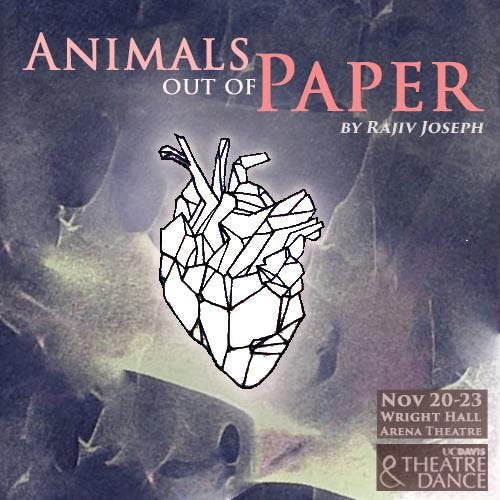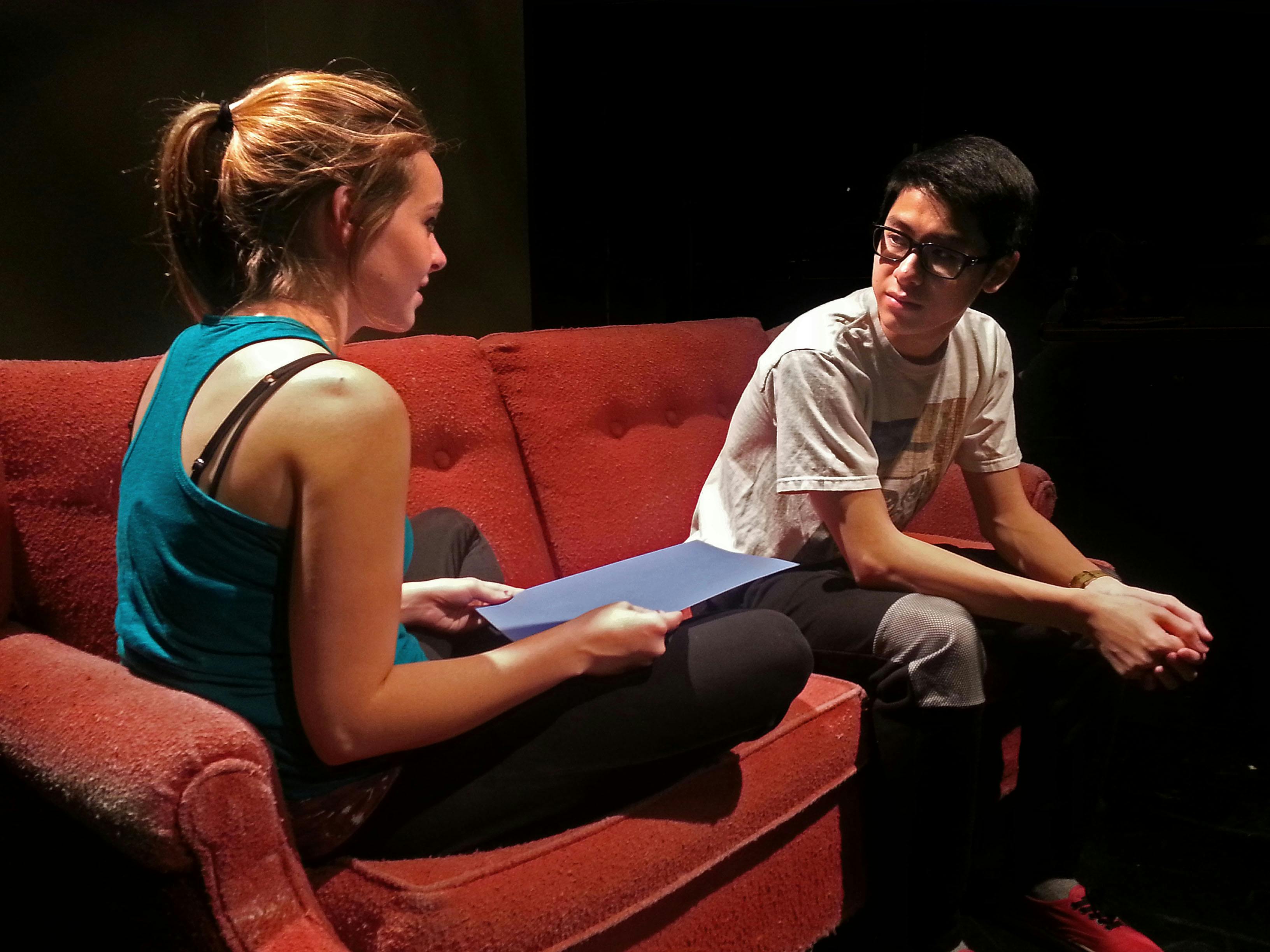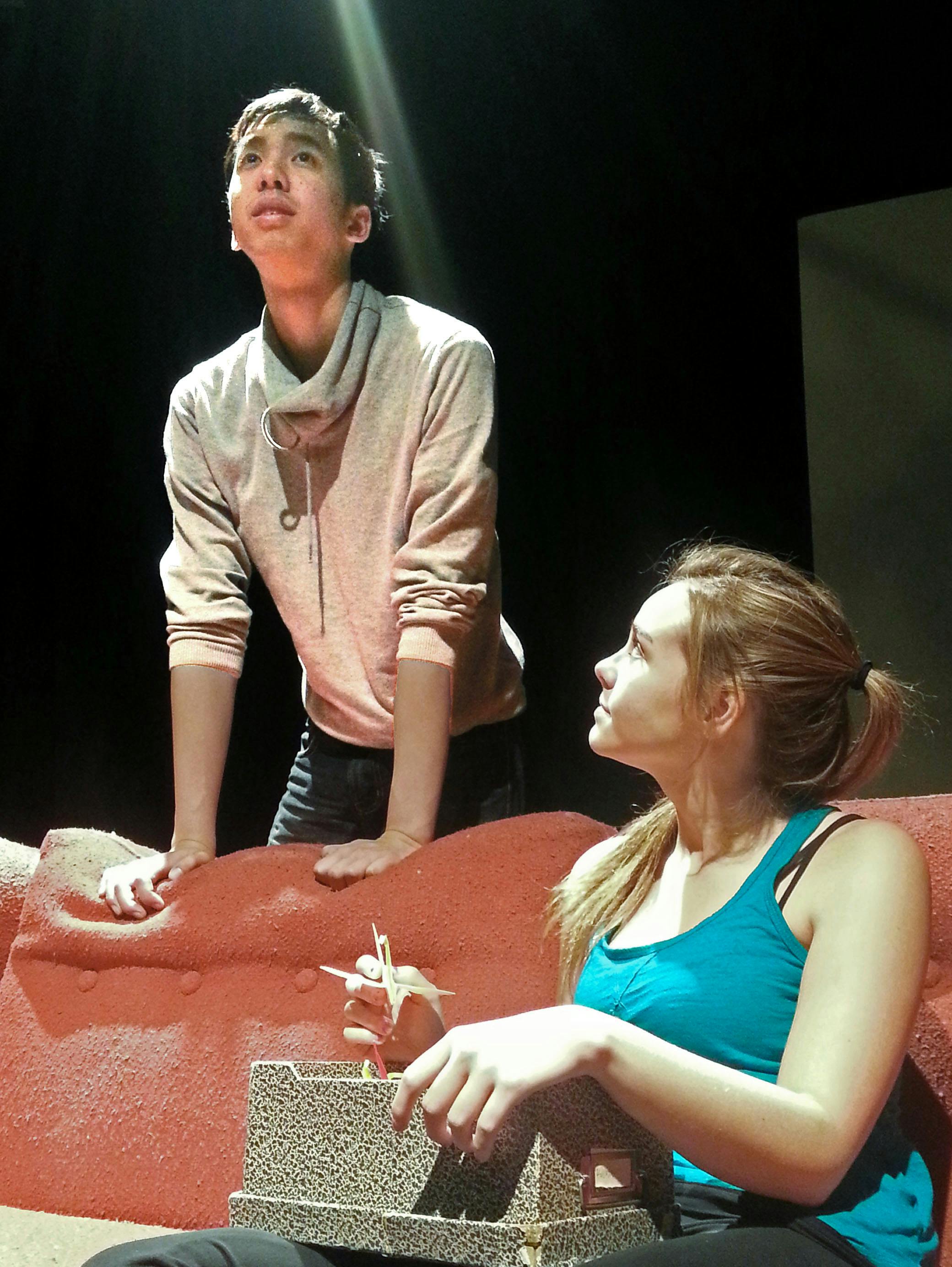news article
Animals Out of Paper: Davis’ Latest “Hip As Fuck” Art Piece
Originally published 11/02/2014.

Animals Out of Paper is an upcoming play here at UC Davis directed by fourth year Dramatic Arts major and Sexualities minor, Micaela Cirimeli. Animals Out of Paper begins as a quirky comedy about origami experts and quickly turns into a melancholy reminder that even the closest people can make the worst messes. This auditory and visual journey from extreme to extreme is exciting, unique and dynamic, pulling realistic and honest insights out of highly unusual situations in accordance with some a unique soundtrack of music specially curated for the show. When a world renowned origami artist opens her studio to a teen prodigy and his smitten school teacher, she finds that life and love is near impossible to arrange neatly in a perfect fold in this dramatic comedy piece.
KDVS was able to talk to the director, Micaela Cirimeli and one of the stars of the play Alan Lieu, who plays Suresh, the high school prodigy in the story to get a little more information about what exactly the play is about, the background, and the music chosen for the show.
Tell us a little bit about yourselves and how you got involved with the play.
Micaela Cirimeli: I’m directing Animals Out of Paper, so this is the first half of my honors project. I primarily stage manage, and this honors project is aimed at giving me different perspectives from which to channel my stage management skills. I’ve done a lot of stage managing in my time here at UC Davis and not a lot of other things. I’ve done some acting and I’ve done some tech work, but mostly stage management, so this is my chance to get my hands in directing, collaborating with designers, working with actors and next quarter I’ll be doing more hands on technical skills and theoretical design work and practical design work, so this is one small part of a large project.
Alan Lieu: I’m actually a 2nd year English Major, but I got involved with Animals Out of Paper because I really like contemporary plays rather than Elizabethan era of dramas. This is my first year doing dramatic art, but I plan to become a double major with Theater and Dance combined with English.
I noticed you used the term ‘Theater and Dance’ as a major rather than ‘Dramatic Arts’. Is there a change coming to the department?
AL: Yes, it’s the new major that is coming out of the department.
MC: Theater and Dance is a new major, the main reason it’s happening is to make the unit requirements smaller so more people can double major. That way, the more majors we get, the more money the department makes. We have a lot of minors, but we don’t get money for those minors, so the more majors, the more money we get! Theater and Dance totally can be a practical thing if you throw yourself into it, but you know, (laughs) people are scared.
Wow, so the department has really made it easy to double major! So, tell us a little bit about Animals Out of Paper. When was it written and who wrote it?
MC: The show is called Animals Out of Paper, written by Rajiv Joseph. It premiered off Broadway in 2009 at Second Stage Theater. This is the second Rajiv Joseph play that’s been here at Davis in the past year. Last spring a couple of students who were in their fourth year did an independent project and did Gruesome Playground Injuries. It’s a two-person play and they did it pretty minimally in the same space we’ll be doing Animals Out of Paper. They did it as an independent project and had about seven different guest directors come in and help them with different things, so I was one of those guest directors. I loved Rajiv Joseph as a playwright, so I chose Animals Out of Paper to do.
Sounds like it’s going to be good! So tell us a little more about what the play is about.
MC: Animals Out of Paper is a three-character three-actor play. It is contemporary and it focuses on human relationships. It centers around three origami artists at various stages of life at various intensities and looks at the way in which human relationships can be really harmful and really hurtful, but also help to cultivate artistic vision and artistic drive.
Where do you come into this Alan?
AL: I come into playing Suresh, a senior in high school. His character has been through a lot in the past year and he has to finish a senior project in which he chooses the topic of origami. His character is energetic and loves to play with the boundaries of what is socially acceptable when interacting with other people. Because he’s a high school kid ending his time there, he kind of sets out to find himself and who he is and what he wants to do in life. That’s what Suresh is going through at this point in his life.

Alan Lieu (Suresh) & Olivia Wetter (Llana) during practice
I hear that Suresh’s character has a really distinct relationship with music- hip hop to be exact. Can you explain that a little further?
AL: Suresh likes listening to Organic Hip-Hop and Rap music. Usually when you listen to music, there’s always some sort of therapeutic outlet that allows you to release some stress. When you listen to rap, you can listen to artists that have lyrics that appeal to you. Suresh’s character is the type to really use rap as an outlet to release his pent up energy and anger, that’s his way of de-stressing.
Do you find yourself similar to Suresh at all?
AL: I listened to a few Organic Hip-Hop instrumentals to familiarize myself a bit and realized that it was kind of the type of music I would listen to if I wanted to study or relax for a bit. Suresh seems similar to me in that way, but specifically speaking, Suresh really is into organic hip hop and rap because it relates to origami in a sense. Organic Hip-Hop is the rawest form of rap music and Suresh sees music and origami very relatedly. He does this in the play by freestyling while folding crease patterns to figure out his own feelings.
So will you be rapping?
AL: Yes!
Freestyle?
AL: No, it’s scripted, but in the script he’s freestyling.
MC: Suresh is literally freestyling in the script, but Alan will be reciting from text, so metaphorically he will be freestyling (laughs).
So because Suresh has this connection to Hip-Hop, where exactly will the music tie into the show? What are you hoping to accomplish by putting this music into the show?
MC: There are a lot of places in the script where Suresh, Alan’s character, is listening to music in his headphones and the audience hears the music through the speakers. So we’re looking at what kind of Rap and Hip-Hop we’re going to put in that. One of the things I want to do is draw a closer connection to Conscious Rap. The sound designer and I are looking at a lot of Conscious Rap that has to do with the cyclical nature of structuralized racism. Especially with what’s going on in our country right now, there’s a lot of killing of young black men for the sake of killing of young black men, so we’re looking at bringing that kind of content into the show and integrating it in a kind of way that fits with not only Suresh’s character but the content of the show, and just kind of clicks in the audience’s mind that as something else that is happening in the world.

Jesse Chung (Andy) & Olivia Wetter (Llana) during practice
Is there anything specific that leads you to choose songs?
MC: In the songs that we pick, we’re trying to draw one of two connections: the cyclical structuralized racism and killing of young black me in our country and the other is to Suresh’s specific situation.
What are some of the songs that you’ve picked out or are thinking about picking out for the show?
MC: So some of the artists and songs we’re looking at is The Coup’s “Fat Cats and Bigga Fish”, Superstition’s “Daydream”, “June” by RJD2 ft. Copywrite, and “Junior” by Aceyalone and RJD2. “Daydream” has a lot to do with Suresh’s situation and it talks about kind of imagining a better world and having issues getting to that. In “June” Copywrite raps about his father, which is similar to the character of Suresh, whose mother died a year ago. “Junior” is one of my favorites that we’ve been looking at. It tells the story of a kid that for the sake of the rap they call “Junior” and it tells the story of a black kid that grew up in the ghetto who was incredibly intelligent and always had his shit together and tells how the cyclical nature of racism, or what they call ‘the revolving door’ in the rap brings him down and gets killed in the end. We’re also looking at beats to fill up the pre-show and transitions.
How do you choose beats? Is it arbitrary?
MC: Actually, no! We are going to bring it a lot of instrumentals, so obviously there will be lyrics in the ones that Suresh is listening to, but our pre-show and intermission music we’re going to have a lot of instrumentals for sure. We’re looking at Parov Stelar, electro-swing stuff. One of the themes in the show is generational gaps and how that infects our human relationships- so Chambermaid Swing and other songs by Parov Stelar amongst others are a way to draw connections between different generations in a way that appeals to multiple generations. As far as transition music and transition beats, we’re looking for things that are energizing and have that same type of generational appeal as well as follow the aesthetic and mood we have in each scene. Each scene transition is a reflection of the last scene and set up for the next scene all at once, so we need to find music that really specifically works for that.
Animals Out of Paper will premiere November 20-22 at 8 PM and November 23 at 2 PM at the Wright Hall Arena Theater. Tickets can be bought for $5 at the door.
by Lorraine Ye
